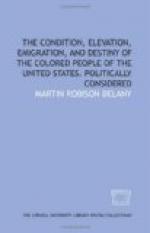When we speak of colonization, we wish distinctly to be understood, as speaking of the “American Colonization Society”—or that which is under its influence—commenced in Richmond, Virginia, in 1817, under the influence of Mr. Henry Clay of Ky., Judge Bushrod Washington of Va., and other Southern slaveholders, having for their express object, as their speeches and doings all justify us in asserting in good faith, the removal of the free colored people from the land of their birth, for the security of the slaves, as property to the slave propagandists.
This scheme had no sooner been propagated, than the old and leading colored men of Philadelphia, Pa., with Richard Allen, James Forten, and others at their head, true to their trust and the cause of their brethren, summoned the colored people together, and then and there, in language and with voices pointed and loud, protested against the scheme as an outrage, having no other object in view, than the benefit of the slave-holding interests of the country, and that as freemen, they would never prove recreant to the cause of their brethren in bondage, by leaving them without hope of redemption from their chains. This determination of the colored patriots of Philadelphia was published in full, authentically, and circulated throughout the length and breadth of the country by the papers of the day. The colored people every where received the news, and at once endorsed with heart and soul, the doings of the Anti-Colonization Meeting of colored freemen. From that time forth, the colored people generally have had no sympathy with the colonization scheme, nor confidence in its leaders, looking upon them all, as arrant hypocrites, seeking every opportunity to deceive them. In a word, the monster was crippled in its infancy, and has never as yet recovered from the stroke. It is true, that like its ancient sire, that was “more subtile than all the beasts of the field,” it has inherited a large portion of his most prominent characteristic—an idiosyncrasy with the animal—that enables him to entwine himself into the greater part of the Church and other institutions of the country, which having once entered there, leaves his venom, which put such a spell on the conductors of those institutions, that is only on condition that a colored person consents to go to the neighborhood of his kindred brother monster the boa, that he may find admission in the one or the other. We look upon the American Colonization Society as one of the most arrant enemies of the colored man, ever seeking to discomfit him, and envying him of every privilege that he may enjoy. We believe it to be anti-Christian in its character, and misanthropic in its pretended sympathies. Because if this were not the case, men could not be found professing morality and Christianity—as to our astonishment we have found them—who unhesitatingly say, “I know it is right”—that is in itself—“to do” so and so, “and I am willing and ready to do it, but only




